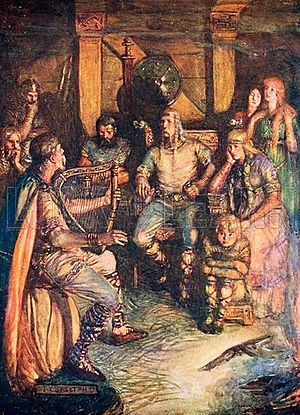Scop facts for kids

A scop (pronounced "shop" or "skop") was a type of poet in Old English poetry. Think of them as storytellers and poets from a very long time ago in England.
The word "scop" is mostly used for poets found within Old English stories, not necessarily for real historical people. This is different from the Old Norse skald, which referred to actual poets. We don't know much about scops, and some experts even wonder if they truly existed as described.
Contents
What Was a Scop's Job?
A scop was like a performer who recited poems and stories. They were often connected to a king's court or a powerful leader's home. They usually stayed in one place for a while, unlike traveling performers called "gleemen."
For their performances, scops likely received valuable gifts. They would often tell well-known stories, such as old legends from the Germanic tribes. But scops also created their own new poems. They might write poems praising their leader or celebrating important events.
Where Did the Word "Scop" Come From?
The word "scop" comes from Old English. It is related to old German words that mean "to create" or "to form." This is similar to our modern English word "shape."
It's interesting because the ancient Greek word for "poet" also means "maker" or "creator." So, the idea of a poet as someone who "shapes" or "creates" stories is very old!
Were Scops Real or Just in Stories?
Some experts believe that the idea of the "scop" might be more of a literary idea than a real historical person. They think it was a way for writers to make their poems feel like they were being spoken aloud and performed, even if they were written down.
However, much of the Old English poetry that still exists sounds like it was meant to be spoken. Some scholars think this "oral quality" comes from even older Germanic traditions.
- Seth Lerer, a literature expert, suggests that the "oral" feel of Old English poetry might be a "literary fiction." This means it was a style choice, not necessarily how it was always performed.
- Michael Alexander, who translated Old English poems, believed scops were real. He thought they were masters of a special kind of poetry called alliterative verse. He said that when a scop became very good, they could compose poems naturally, almost without thinking about the rules.
- Hugh Magennis, another scholar, looked at the famous poem Beowulf. He pointed out that the poem describes a character who "remembered a multitude of stories" and "found new words." This sounds like a scop. But Magennis says that when we read Beowulf today, the narrator (the scop) isn't really there. So, while the poem feels like it's being spoken by a scop, it's actually a written work. It reflects on an old heroic world rather than coming directly from it.
Even if scops weren't always real people, the idea of a poet-performer appears often in Old English literature. Poems like Widsith and Deor (found in the Exeter Book) use the image of a poet in a mead-hall (a large gathering hall). These poems, along with Beowulf, show strong connections to an oral storytelling culture.
See Also

